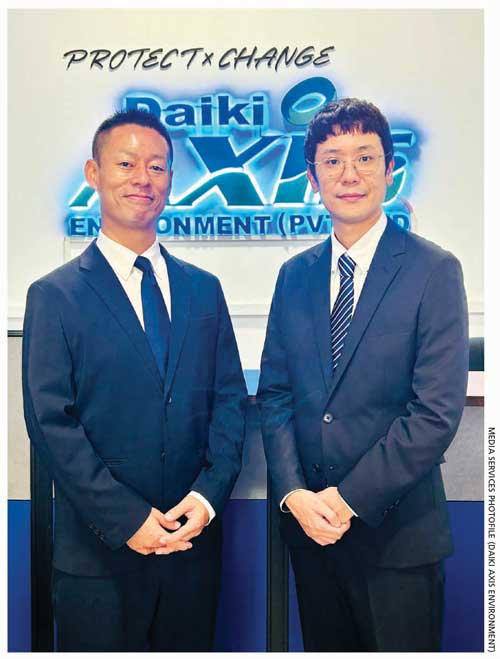DAIKI AXIS ENVIRONMENT
 Q: What financial strategies does Daiki Axis Environment employ to support its sustainability initiatives and reduce environmental impacts?
Q: What financial strategies does Daiki Axis Environment employ to support its sustainability initiatives and reduce environmental impacts?
A: We’re actively working to enhance our return on equity (ROE) as a key strategy to ensure financial robustness, secure a stable cash flow and sustain investments in growth sectors. Our financial health indicators including the capital adequacy ratio are closely monitored and when necessary, we raise funds within an appropriate range of leverage.
To bolster profitability, we’ve established quantitative targets for net sales – a metric indicative of business growth potential – and operating income maintaining the same ratio, which is a measure of added value. Various strategic measures are being implemented to achieve these targets.
The Daiki Axis Group is committed to advancing environmental improvements and contributing to a sustainable society by addressing water related issues. In line with this commitment, we’re proactively raising funds through green bonds, sustainability loans and impact investments, underscoring our dedication to sustainability financing.
Q: Are there specific areas of innovation or technology where Daiki Axis Environment is focussing its investment to enhance environmental solutions?
A: We regard environmental issues as a paramount aspect of our management strategy with emphasis on addressing water related challenges through the implementation of decentralised wastewater treatment technology – the Johkasou.
Unlike centralised wastewater treatment, where wastewater is collected in one location and treated after the establishment of a network of sewage pipes as part of public infrastructure, decentralised wastewater treatment focusses on treating wastewater in smaller areas or within buildings such as houses, apartments and hotels.
To meet increasing demand, we’re investing in a local factory for manufacturing within Sri Lanka. Additionally, collaborative research with local universities is underway to tailor the Johkasou technology to better suit Sri Lanka’s specific needs.
Our dedication to innovation and sustainability was recently recognised at the Lanka Business Awards 2023, where we proudly received four accolades: Innovative Business of the Year, Green Business of the Year, Fastest Growing Small Business of the Year and Dynamic Business of the Year.
Q: How does the company evaluate and prioritise investments in projects that align with its sustainability objectives?
A: While assessing financial indicators such as project feasibility, expected return on investment and payback period is crucial, we recognise the equal importance of raising awareness about Daiki and its products in the market.
In regions where environmental infrastructure struggles to keep up with rapid urban development, implementing large-scale wastewater treatment infrastructure demands advanced technology throughout development, design and construction.
It also entails a substantial financial investment, a prolonged time frame and significant human resources.
In contrast, our flagship product Johkasou represents a wastewater treatment solution that’s not only easy to install but also relatively cost-effective. This allows for the rapid development of environmental infrastructure.
We’re confident that the water treatment systems we offer serve as the cornerstone of essential living infrastructure, providing a sustainable and efficient solution to evolving environmental challenges.

Q: Are there specific regions or countries that the company is targeting for export market expansion – and what factors influence these choices?
A: Having successfully exported to Myanmar and the Maldives, we’re strategically leveraging Sri Lanka’s geographical advantage to extend our reach to the southern region of India, Bangladesh, the Middle East and East Africa. Daiki Group’s manufacturing bases in northern India, Indonesia and China provide a foundation for this expansion.
The current challenge lies in establishing and enhancing the efficiency of an optimal production and supply system within the group, carefully considering factors such as cost competitiveness including tariffs and transportation costs.
This effort reflects Daiki’s commitment to not only diversifying our market presence but also ensuring a streamlined and cost-effective production and supply chain infrastructure that aligns with the unique demands of each region.
Q: How does Daiki Axis Environment adapt its products or services to meet the environmental needs and regulations of different global markets?
A: Johkasou, a technology developed in Japan in 1958, is a certified product endorsed by the Japanese government. The Johkasou certification system ensures compliance with specific product quality standards, offering a level of quality assurance sanctioned by the country.
Given that each country and region has its own standards and requirements, and Daiki’s extensive Johkasou expertise developed over the years, we are able to tailor proposals to align with the standards of any location.
Daiki’s approach involves not only understanding the legislative landscape in each country but also leveraging our knowledge of Japanese legislation. We aspire to propose a performance testing system to both local and international governments, ensuring that on-site STP (sewage treatment plant) performance aligns with specific water quality standards.
Additionally, we advocate for the establishment of appropriate water quality regulations and monitoring post-installation.
Going beyond, we offer specific technical and economic solutions to facilitate the products for market development.
This comprehensive strategy underscores our commitment to not only delivering products but actively contributing to the establishment of effective regulatory frameworks and sustainable water management practices worldwide.
– Compiled by Tamara Rebeira
COMPANY DETAILS
Telephone: 2499949 | Email: infolanka@daiki-axis.com | Website: www.daikiaxis.lk




